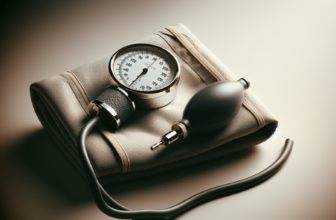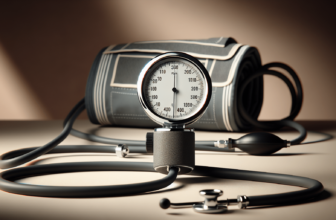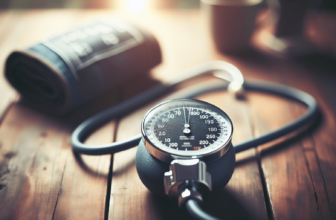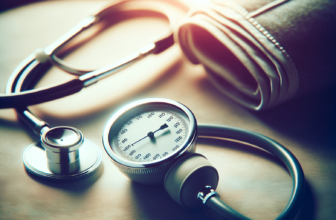15 High Blood Pressure Symptoms and Their Impact on Your Health

Ever wondered if your health concerns could be tied to high blood pressure? Discover 15 symptoms that might be affecting you and learn how they can impact your overall well-being.
Frequent Headaches

Getting headaches often can be a sign that your blood pressure is too high. If you find yourself taking pain relievers more frequently, it’s a good idea to check your blood pressure to see if that might be the cause.
High blood pressure can lead to persistent headaches that interfere with your daily life. Monitoring your blood pressure regularly can help you catch any issues early, allowing for timely management and relief from frequent headaches.
If you notice an increase in headaches, it might be linked to your blood pressure. Keeping an eye on your blood pressure levels and talking to your doctor can help you figure out if this is the reason and what steps to take next.
Dizzy Spells

Ever feel like the room is spinning? High blood pressure can affect the inner ear, which helps control balance. This might lead to sudden dizziness or a feeling of being off-kilter.
When your blood pressure rises, it can reduce the blood flow to your brain. This lack of oxygen can make you feel lightheaded or faint, particularly when you stand up quickly.
If you’re experiencing dizzy spells, it might be a sign that your blood pressure is too high. Keeping track of your blood pressure and talking to your doctor can help manage these symptoms.
Blurred Vision

High blood pressure can mess with your eyesight, making things look blurry or even giving you double vision. It’s a good idea to check your blood pressure if your vision changes suddenly.
Sometimes, high blood pressure can cause fluid to build up under the retina, leading to distorted vision. If you notice this, getting your blood pressure checked could help pinpoint the issue.
Long-term high blood pressure can damage the blood vessels in your eyes, which might result in vision problems. Regular eye exams and blood pressure monitoring can help catch these issues early.
Chest Pain

If you’re feeling chest pain or discomfort, it might be a sign of high blood pressure. It’s important to take it seriously. Talk to your doctor right away to find out what’s causing it and get the help you need.
Chest pain can sometimes feel like a tightness or pressure in your chest. This can be a warning sign of something serious, like high blood pressure. Don’t wait; make an appointment with your doctor as soon as you can.
Ignoring chest pain isn’t a good idea. It could be connected to high blood pressure, which needs to be managed properly. Seeing a doctor quickly can help you avoid bigger health problems down the road.
Shortness of Breath

Feeling out of breath can be a sign that your heart and lungs are struggling. High blood pressure can make it harder for these organs to work efficiently, leaving you gasping for air even during simple activities.
When your blood pressure is high, your heart has to pump harder to move blood through your body. This extra effort can make you feel short of breath, especially during exercise or when you’re stressed.
High blood pressure can also cause fluid buildup in your lungs, making it difficult to breathe. If you’re experiencing frequent shortness of breath, it’s important to check your blood pressure and talk to a healthcare provider.
Fatigue

Feeling extra tired lately? High blood pressure can drain your energy, making even simple tasks feel overwhelming. This constant fatigue can affect your daily life and overall well-being.
Struggling to keep up with your day? When your blood pressure is high, your body works harder to pump blood, leaving you feeling worn out. It’s important to manage your blood pressure to maintain your energy levels.
Feeling exhausted more often? High blood pressure can make your heart work overtime, leading to persistent tiredness. Taking steps to control your blood pressure can help you regain your energy and improve your quality of life.
Nosebleeds

Frequent nosebleeds can sometimes be more than just a result of dry air. They might be a sign of high blood pressure. If this happens often, it’s a good idea to check with your doctor to rule out any serious issues.
High blood pressure can cause the blood vessels in your nose to become more fragile, leading to more frequent nosebleeds. Keeping an eye on your blood pressure and managing it well can help reduce the occurrence of these nosebleeds.
Nosebleeds can be alarming, but they often have manageable causes. Along with high blood pressure, other factors like allergies, infections, or certain medications can contribute. Understanding these triggers and addressing them can help prevent frequent nosebleeds.
Irregular Heartbeat

An irregular heartbeat, or palpitations, can feel like your heart is skipping beats or fluttering. This sensation might occur occasionally or frequently, and it’s often tied to stress, caffeine, or alcohol consumption.
Sometimes, an irregular heartbeat can signal an underlying condition like high blood pressure. It’s important to monitor your heart’s rhythm and consult with a healthcare professional if you notice persistent irregularities.
Lifestyle changes such as reducing caffeine, managing stress, and maintaining a balanced diet can help manage an irregular heartbeat. Regular check-ups with your doctor can also ensure any potential issues are addressed early.
Difficulty Sleeping

Struggling to fall asleep or stay asleep? High blood pressure might be the culprit. It can disrupt your sleep, leaving you tossing and turning at night. Ensuring good sleep hygiene and managing stress can help improve your rest.
Did you know that high blood pressure can affect your sleep quality? Many people with this condition experience frequent waking during the night. Keeping a regular sleep schedule and reducing caffeine intake can make a big difference.
Restful sleep is crucial for overall health, but high blood pressure can make it hard to achieve. This condition can lead to sleep disorders like sleep apnea. Seeking medical advice and making lifestyle changes can help you sleep better.
Swollen Ankles

Swelling in your ankles and feet can point to your blood pressure affecting your circulation. This happens because high blood pressure makes your heart work harder, which can cause fluid to build up in your lower legs.
If you notice your ankles are often swollen, it might be a sign of more serious issues like heart, kidney, or liver problems. It’s important to keep an eye on this symptom and talk to a healthcare professional if it persists.
There are simple ways to help reduce swelling, like elevating your feet, staying active, and avoiding standing or sitting for long periods. Drinking plenty of water and reducing salt intake can also make a difference.
Flushing

If you notice sudden redness in your face, it might be due to high blood pressure. This condition can cause blood vessels to expand, leading to a flushed appearance. It’s important to monitor your blood pressure regularly and consult with a healthcare provider if you experience this symptom.
Flushing can sometimes be a sign of stress or anxiety, which can also elevate blood pressure. Managing stress through relaxation techniques, such as deep breathing or meditation, can help reduce the likelihood of experiencing this symptom. Keeping stress levels in check is key to maintaining overall health.
Certain medications can cause flushing as a side effect, which might be mistaken for high blood pressure. If you start a new medication and notice facial redness, talk to your doctor. They can determine whether the medication is responsible or if further investigation is needed.
Nervousness

Sometimes, feeling anxious or jittery can be a sign of high blood pressure. It’s important to monitor your blood pressure regularly to ensure it stays within a healthy range and to address any potential issues early on.
High blood pressure can cause physical symptoms like headaches, but it can also make you feel nervous for no clear reason. If you often feel anxious without knowing why, it might be worth checking your blood pressure.
Managing stress and maintaining a healthy lifestyle can help keep your blood pressure in check. Regular exercise, a balanced diet, and relaxation techniques can all contribute to reducing feelings of nervousness linked to high blood pressure.
Tinnitus

Hearing a constant ringing in your ears, known as tinnitus, can often be linked to high blood pressure. This condition shouldn’t be ignored, as it could signal an underlying health issue that needs attention.
Tinnitus might sound like a buzzing, hissing, or whistling noise. It’s not a disease but a symptom that can stem from various causes, including high blood pressure. Managing your blood pressure can help reduce these annoying sounds.
Besides high blood pressure, tinnitus can also be caused by exposure to loud noises, ear infections, or earwax buildup. It’s important to consult a healthcare provider to determine the exact cause and appropriate treatment.
Blood Spots in Eyes

Noticing blood spots in the whites of your eyes? This can signal high blood pressure. When your blood pressure is too high, tiny blood vessels in your eyes can burst, causing these spots. It’s a good idea to check your blood pressure regularly.
Blood spots in the eyes might seem alarming, but they’re usually harmless and often clear up on their own. However, if you frequently notice them, it could be a sign to get your blood pressure checked. It’s always better to be safe and consult a doctor.
High blood pressure isn’t the only cause of blood spots in the eyes. They can also result from straining, coughing, or an injury. Still, if you notice them often, it’s worth discussing with a healthcare provider to rule out any serious conditions.
Reduced Exercise Tolerance

Struggling to keep up with your workouts? High blood pressure could be the reason. It can make your heart work harder, leaving you feeling more tired than usual during exercise.
Noticing that you’re out of breath quicker than before? High blood pressure can reduce your stamina. It affects the way your blood flows, causing your muscles to get tired faster.
Finding it challenging to finish your usual exercise routine? High blood pressure might be the culprit. It can make even simple activities feel more exhausting, impacting your overall fitness.
Conclusion
In summary, recognizing the symptoms of high blood pressure is crucial for maintaining good health. By being aware of these signs, you can take proactive steps to manage your blood pressure effectively. Remember, early detection and lifestyle changes can make a significant difference in your well-being. Stay informed and take care of your health to enjoy a better quality of life.







